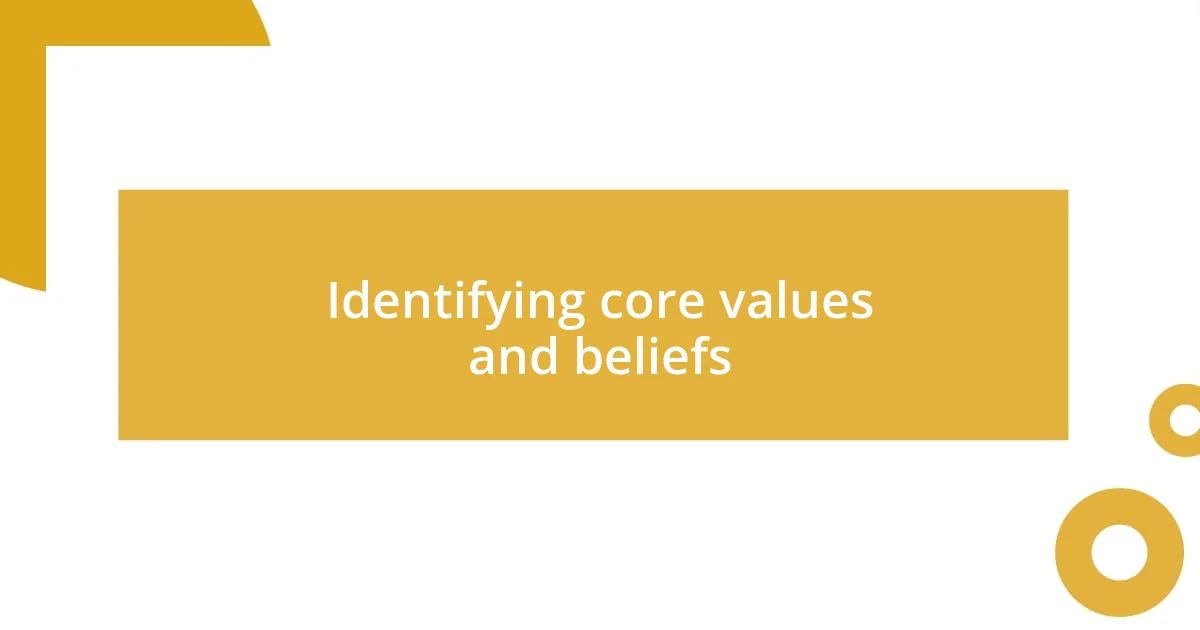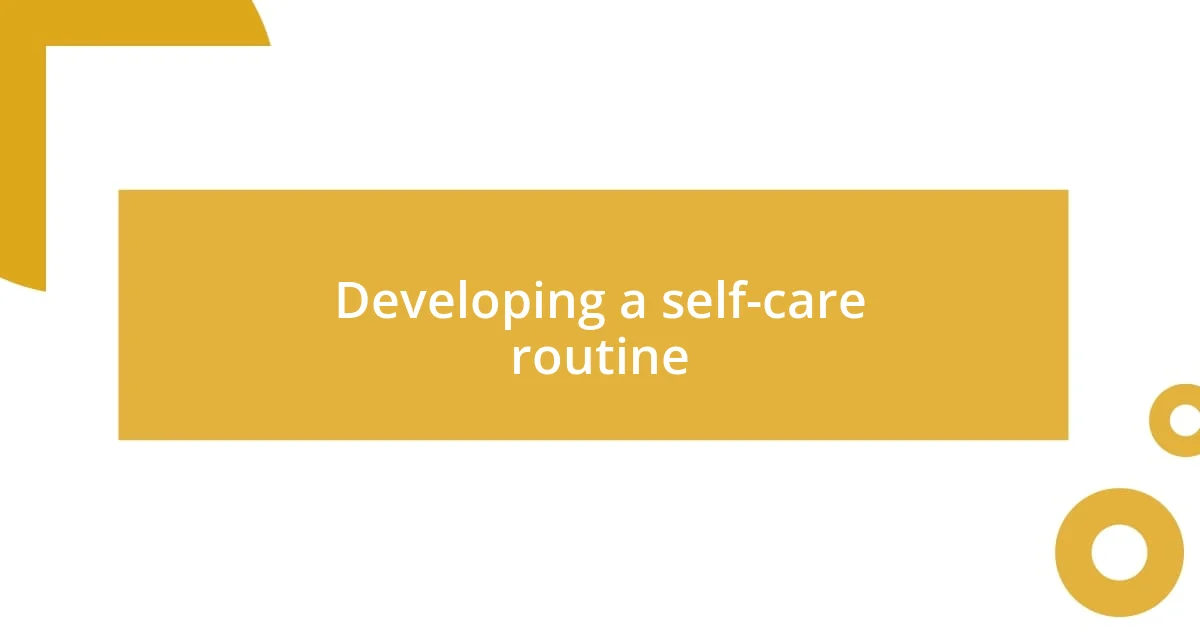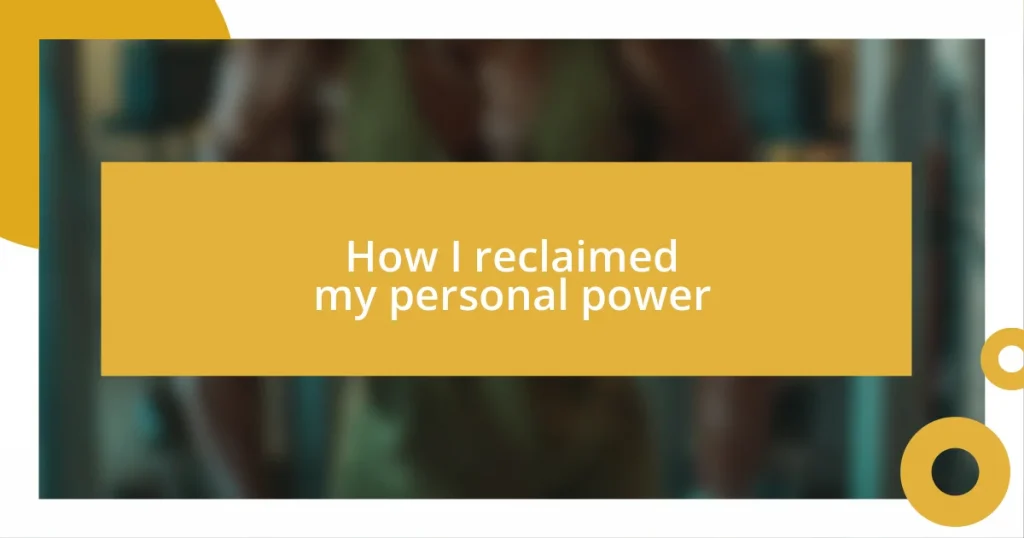Key takeaways:
- Reclaiming personal power starts with self-awareness, embracing emotions, and challenging limiting beliefs.
- Setting clear boundaries and practicing assertiveness enhance confidence and empower individuals to prioritize their well-being.
- Creating a supportive environment, both socially and physically, fosters personal growth and nurtures a sense of empowerment.

Understanding personal power
When I first started to explore personal power, I was struck by the realization that it’s not just about authority or control over others; it’s deeply rooted in how I perceive myself and my choices. I remember sitting in a quiet room, reflecting on moments in my life when I felt powerless, and asking myself, “What if I could reclaim that strength?” The truth hit me: personal power begins with self-awareness and the ability to challenge my limiting beliefs.
A few years ago, I found myself in a routine that drained my energy and enthusiasm. It took a moment of vulnerability—like sharing my insecurities with a close friend—to recognize that my personal power was being overshadowed by fear and doubt. This experience taught me that acknowledging my feelings wasn’t a sign of weakness; rather, it was a pivotal step toward empowerment. I realized that embracing my emotions can be a powerful catalyst for change.
Understanding personal power also means recognizing that it can ebb and flow throughout life. I often reflect on how my energy shifted during transitions, like starting a new job or moving to a different city. It’s fascinating how our experiences shape us; I’ve learned that every setback can be redefined as an opportunity to harness that power anew. What moments in your life can you look back on and recognize as turning points for your own strength?

Recognizing signs of disempowerment
Recognizing the signs of disempowerment can be surprisingly subtle, yet they can have a profound impact on our lives. For me, it started with a nagging sense of dissatisfaction that I couldn’t quite place. I recall a time when I hesitated to share my thoughts during meetings, worried they’d be dismissed. That feeling of invisibility was a clear indicator that my confidence was slipping away.
Here are some signs to look for that may suggest you’re feeling disempowered:
- Difficulty expressing your opinions or feelings
- Chronic feelings of inadequacy or self-doubt
- Frequent comparison to others and feeling like you never measure up
- Procrastination or avoidance of tasks that once excited you
- A growing reliance on others for validation
- Feeling drained after social interactions or events
These signs can serve as wake-up calls. When I noticed these patterns in myself, it was time to reflect and take back control.

Identifying core values and beliefs
Identifying core values and beliefs is a transformative process that I found essential in reclaiming my personal power. Initially, I felt lost, like a ship without a compass. I started jotting down what truly mattered to me—honesty, love, creativity. This act of writing wasn’t just a list; it was a clear and visual representation of my innermost values, helping me pinpoint what I wanted to prioritize in my life.
As I delved deeper into my beliefs, I stumbled upon moments that truly defined my identity. I vividly recall a time when I chose to speak up about a cause I believed in, despite the apprehension that filled my chest. It was incredible how aligning my actions with my core values ignited a sense of empowerment I hadn’t felt in years. Each small step I took brought me closer to what I stood for, creating a ripple effect that bolstered my confidence.
I can’t stress enough how imperative it is to periodically reassess these values. Life has a way of shifting our priorities, and staying in touch with what I believe fuels my sense of self. When was the last time you reflected on what defines you? My insights have shown me that the clearer I am about my beliefs, the more connected I feel to my personal power.
| Core Values | Personal Beliefs |
|---|---|
| Honesty | Transparency in relationships |
| Creativity | Innovation breeds progress |
| Empathy | Understanding fosters connection |

Developing a self-care routine
Developing a self-care routine has been a game changer for me. It began as simple acts, like setting aside 10 minutes each day to enjoy my morning coffee without any distractions. These moments of mindfulness felt indulgent at first, but gradually, they transformed into a lifeline that grounded me in my day-to-day life.
One of the most impactful aspects of my self-care journey has been the importance of consistency. I used to think that self-care meant a spa day or a weekend getaway, but I’ve learned that it’s in the small, regular practices that true empowerment resides. Whether it’s a nightly gratitude journal or a walk in nature, these rituals have provided me with a sense of stability and routine. Have you ever noticed how a reliable practice can uplift your mood? For me, these small acts became affirmations of self-worth, reinforcing the notion that I deserve time dedicated to my personal well-being.
As I continued to develop my self-care routine, I discovered the joy of flexibility within it. It’s easy to fall into a rigid schedule, but I learned to listen to what I need on any given day. Some mornings, I might crave a brisk workout, while other days call for a cozy reading session. By tuning in to my body and emotions, I’ve cultivated a routine that feels nourishing rather than obligatory. I often ask myself, “What do I need today?” It’s this simple question that has made my self-care routine not just a series of tasks, but a personalized journey toward reclaiming my energy and potential.

Setting clear boundaries
Setting clear boundaries was a crucial step on my journey toward reclaiming my personal power. I remember the first time I confidently told a friend that I needed time to myself instead of always being their emotional support. That moment was liberating; it made me realize that my well-being mattered just as much as anyone else’s. I found myself asking, “If I don’t protect my time, who will?”
Over time, I began to identify specific areas where I had allowed others to overstep my limits. For instance, I used to respond to work emails late at night, feeling pressured to maintain availability at all hours. By implementing a clear ‘no emails after 7 PM’ rule, I reclaimed precious time for relaxation and self-reflection. It’s surprising how simply saying “no” can shift the dynamics of our relationships and restore our sense of control.
Establishing boundaries hasn’t always been easy, though; pushing back against societal expectations can feel daunting. I still recall an uncomfortable conversation with a family member who dismissed my boundaries, claiming it was selfish. In those moments, I reminded myself that honoring my needs is not only a source of empowerment but also a necessary act of self-respect. I’ve learned that boundaries are not just limitations; they’re the foundation of healthy relationships that nurture my personal power. What boundaries are you ready to set in your own life?

Practicing assertiveness techniques
Practicing assertiveness techniques has been a revelation for me. I remember the first time I asserted myself in a meeting. Instead of staying quiet while others spoke over me, I took a deep breath and voiced my opinion. The moment I did, I felt a surge of confidence, almost like reclaiming a part of myself that had been hidden for too long. Have you ever felt that rush when you finally say what you’ve been holding back?
One technique that really helped me was using “I” statements to express my feelings clearly. For example, instead of saying “You never listen,” I learned to frame it as “I feel unheard when I’m interrupted.” This subtle shift not only made my communication more effective but also reduced defensiveness from others. It’s interesting how addressing a situation with empathy can enhance understanding, isn’t it? I’ve noticed that conversations became more constructive, transforming conflict into collaborative dialogue.
Additionally, I found role-playing assertiveness scenarios with a trusted friend to be incredibly useful. Practicing responses to potential conflicts helped me feel more at ease in real situations. I can still recall the first time I stood up to a rude customer service representative; the confidence from our rehearsals gave me the courage I needed. It was exhilarating! I encourage you to think about an assertive response you’ve been hesitant to share. What steps can you take to make that a reality?

Creating a supportive environment
Creating a supportive environment has been vital in my journey. I remember when I started surrounding myself with positive influences, like friends who uplifted my spirit rather than drained it. Initially, it felt strange to step away from relationships that had become toxic, but I soon realized that fostering growth meant curating my circle. Have you ever experienced that shift when you let go of negativity?
I also learned the importance of physical spaces in cultivating support. A messy environment can feel overwhelming, while a clean, organized space invites clarity and peace. When I dedicated time to declutter my living area, I noticed a marked improvement in my mood. It’s almost magical how the energy of our surroundings affects us, isn’t it?
Moreover, seeking communities that resonate with my values has been empowering. Joining a local group focused on personal development offered connection and accountability. I still cherish the bonds formed there, as they remind me that I’m not alone on this path. Have you considered where you might find your support tribe?














